Maggie Patton, Alex Buckley and Gabrielle Union are fun-loving moms and co-founders of Bitsy’s, an organic snack food company. Their shared experiences and passions led to rolling up their sleeves, researching, testing and tasting then creating real-deal yummy, nutritious snacks for families and kids. Together, they are proud to be a women-owned business that is focused on making healthy and nutritious snacks accessible and affordable to all families.
What does “entrepreneurship” mean to you?
Bitsy’s Co-Founders: Pardon the technical language here, but entrepreneurship involves three things: allocating your resources to allow you to do the most good; asking “what comes next” not just “what works today?”; and realistic, optimistic tenacity. At-all-costs growth is the wrong metric to rally around, for us. Some entrepreneurs spend a ton of energy trying to get further, to convert people to their way of thinking. Bitsy’s has always seen the highest returns to any part of the business – including the humans behind the company – when we spend the most energy trying to be better. Other brands can copy our messaging, but they can’t duplicate what allowed us to get there first.
How did your company come to be?
B: Our background is in the non-profit space, where we developed programs to empower kids to become agents of change. Among those was one of the first, federally-funded childhood obesity prevention initiatives, an experience that was less of an a-ha moment and more of a steady realization that kids constantly are being marketed junk food and that access to nutritious, good-tasting, packaged food for children and families is really limited, particularly in traditionally underserved communities.
How has your business changed in response to the COVID-19 pandemic?
B: The pandemic has reaffirmed our mission and placed our focus on ways our business can and must be better to make it happen. Food is an essential good. But food isn’t grown, produced, sold, or consumed just because it’s needed. Access is more important than ever, and the pandemic – and the surge in ecommerce consumption – is both a heartbreak for the world and an opportunity for those companies who are willing to take a beat to structure things in a way that supports that.
In terms of our hearts as entrepreneurs and as parents, our roles have become intertwined as never before. Part and parcel of this is the opportunity to revise our – and the world’s – notion of “wellness” – what it really means and how Bitsy’s can position itself to respond. Our priority is and continues to be supporting the physical, emotional, and mental health of families and kids.
One way that’s grown is our expanded definition of “family.” It’s all hands on deck. A teacher tasked with partial in-person learning; a babysitter who’s basically living at another family’s home; a neighbor who’s buying snacks in bulk to distribute to their kids’ friends.
Another way is our increased focus on access. Being available in more doors isn’t just a question of business health. It’s about identifying and meeting food scarcity and solving it where it is, not where we want people to be.
What is your proudest and darkest moment so far? Share a key high and a key low from your journey if you can.
B: There have been so many highs and lows (often both, in a single hour). We work hard to not to get too wound-up when things go extremely well or utterly terribly. There’s always work to be done.
That said, Gabrielle’s belief in Bitsy’s and its potential to have a meaningful impact on the health of all kids and families and her decision to join our team in a powerful role: as a co-founder. That certainly was a moment when we paused… and then wept. So much of this journey from day one has been a struggle, not just for visibility and awareness but also, in a larger sense, of working to get to a place where we’d have the scale and platform to realize our mission.
We didn’t start Bitsy’s because we had a particular affinity for baking; we didn’t dream up a cookie that we were dying to sell. Our inspiration for Bitsy’s was a belief that all kids deserve access to nutritious, affordable foods, as well as a real understanding of why healthy matters, that accomplishing this doesn’t have to mean granola and shouldn’t mean sacrificing convenience and taste.
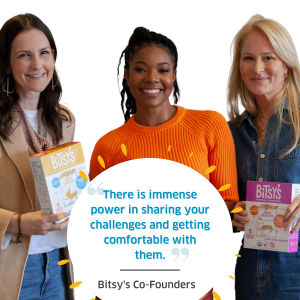 How is your company changing the landscape?
How is your company changing the landscape?
B: Our goal is to make nutritious, safe (allergen-sensitive) snacks accessible and affordable for all families, regardless of geography or socioeconomic status—to reach marginalized and underserved communities and to help give all kids opportunities to make healthy choices in their lives.
Look at other brands in other industries forging unexpected paths: Mad Happy weaving mental health into a humble sweatshirt; MSCHF foregoing a product roadmap entirely and instead involving their community in what is offered to them; Attn: Grace taking the DTC principles of linear commerce and modern branding and applying them to the often-underserved audience of people above 40. In food, our long-time partner Whole Foods has spoken out about “conscious capitalism” – working within the system, not denying the existing limitations, and created its 365 Stores, offering those products online too.
What we can do tomorrow will hopefully look very different from what we can do today.
What do you wish you knew when you started? Is there anything you would do differently?
B: There are so many things we’d do differently – really, how much time do you have? We’ve made mistake after mistake, and some in hindsight were pretty obvious; some weren’t. A few were very, very bad. But the main thing with mistakes, for us – and not to sound too self-help-y here – is not to let them become a source of paralysis. Sometimes that’s easier said than done but really, it’s what we tell the kids: if you’re not falling down (literally, metaphorically – the whole thing) then odds are you’re not learning, or even trying very hard.
Successes are so easy to share: a massive valuation, an incredible exit, a seemingly-prescient investment decision, a product that so naturally fit the market, it blew up. There is immense power in sharing your challenges and getting comfortable with them. (Michelle Obama’s openness about depression is a perfect example of this. Lead the day!)
Having a big idea and going after it means taking on and welcoming your challenges, inevitably. Move on.
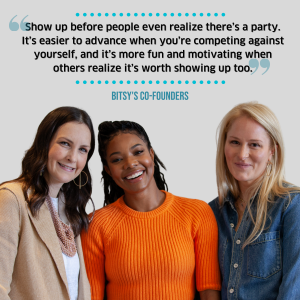 What advice/credo do you live by as you grow the business / what is your professional and personal mission statement?
What advice/credo do you live by as you grow the business / what is your professional and personal mission statement?
B: Our credos are imprinted on our cookies. Buy a box and read them all! (ALWAYS BE SELLING.)
Where do you find inspiration when faced with challenges?
B: Late-night texts. Our children. Deep breaths. God. Rainbows. Reading. A walk. We need it all.
What does “success” look like for you? What do you think will help you achieve it?
B: Success is a loaded word. When I was growing up, my dad always told me if I was a good person, he’d always see me as a success. Well, what does being a “good person” mean? It’s sort of an abstract term and yet as a kid, it meant to me that living with my values first was the most important thing. Success is living a life with integrity, love, and impact. For us, success is seeing our business grow to a place where we can say that it truly has had an impact, while raising our families without regret.
Has personal or professional “success” changed for you since the COVID-19 pandemic?
B: If anything, our definition of “success” has broadened, since holding ourselves to the same standards that we employed pre-Covid is a pretty good way to go to bats. Learning to give ourselves and others a little more grace is a practice, but it’s one that I think will serve us beyond this moment in time.
What’s it like to work alone or with your partners? What advice do you have for fellow entrepreneurs about building and leading teams?
B: Honestly on this, we just got lucky. Our team is small, mighty, and the most dedicated, talented, group of individuals this world has ever known. Each of them leads with their heart, and we just try to follow their example.
Many entrepreneurs continue to perfect their daily routines to support their work and greater vision; would you mind sharing your morning routine or a regular ritual that grounds your work each day? How has it changed in recent months?
B: There is ONE ritual that is key to functioning as a mother and an entrepreneur. And it’s SLEEP. Sleep is the most important thing.
What keeps you motivated during this time?
B: Our kids. All kids. Our team and each other. Failure is not an option.
What kind of an entrepreneur do you want to be known as, as in, what do you want your legacy to be?
B: While our legacy as individuals is not our priority, but we hope the practice of being an entrepreneur, especially for those trying to establish credibility for a certain type of product, is more human as a result of what Bitsy’s can and will do. New ways of thinking or operating need time to prove their value. This is okay. When solving a problem, first: drink water and get sleep. Becoming an excellent company involves constantly looking at your existing map and improving it.
Show up before people even realize there’s a party. It’s easier to advance when you’re competing against yourself, and it’s more fun and motivating when others realize it’s worth showing up too.
Do you have someone you’d like to nominate to be profiled in our Faces of Entrepreneurship series? Please let us know by emailing media@thecenter.nasdaq.org.
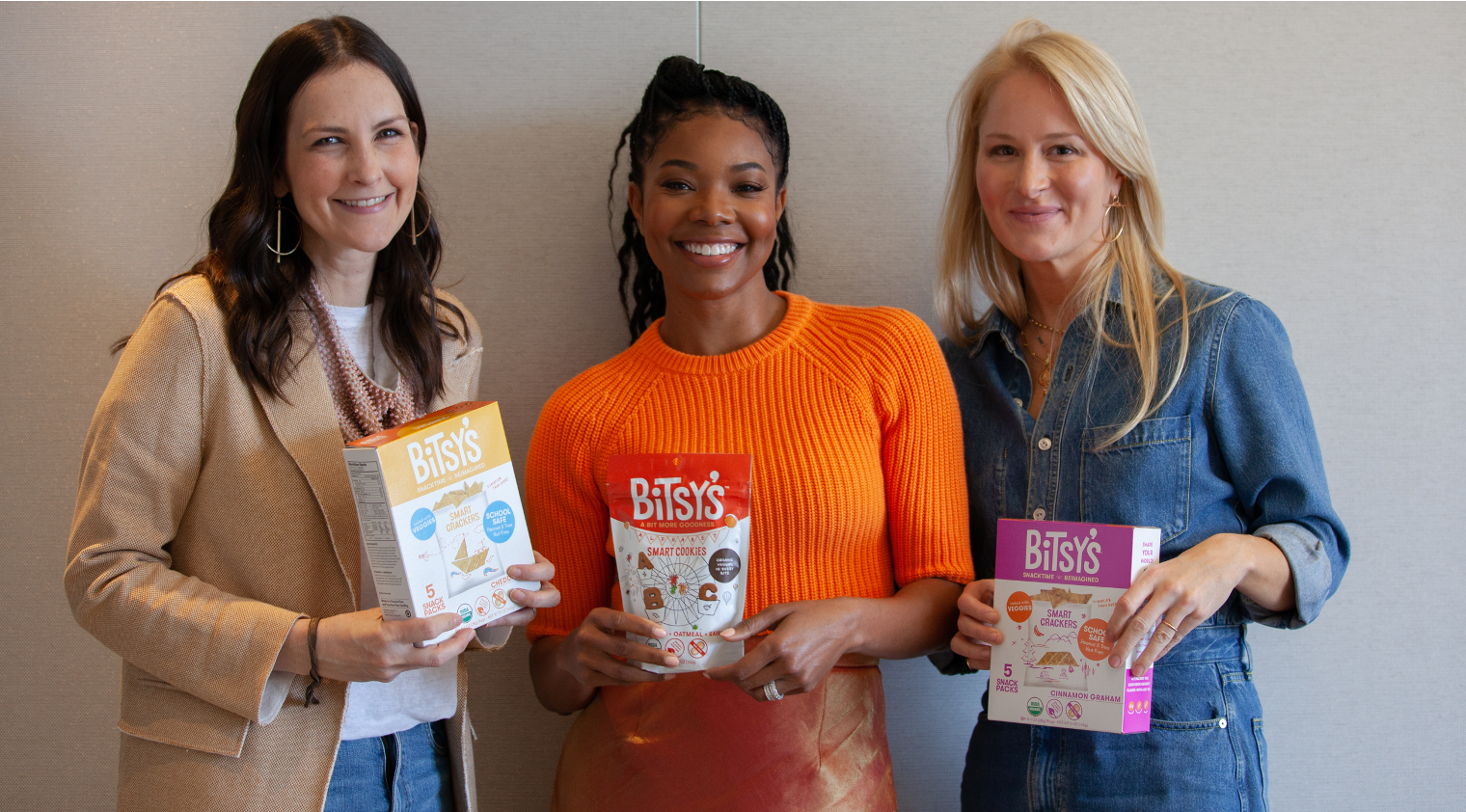
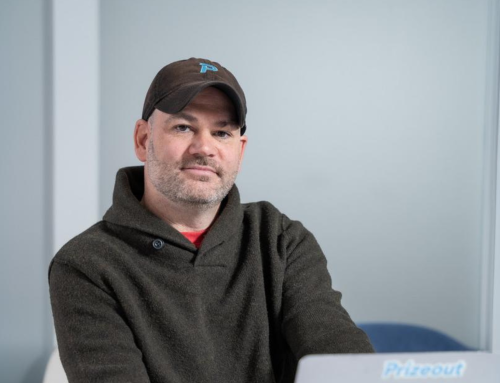
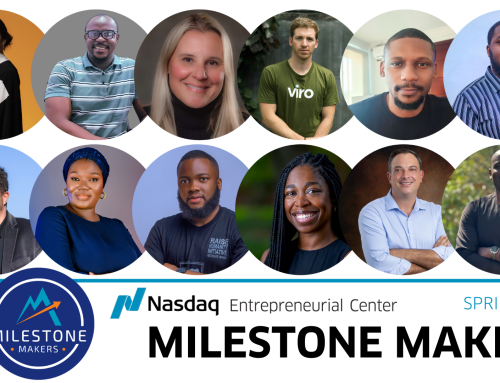
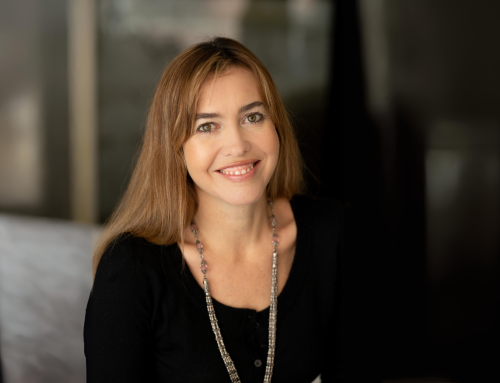
Invite a Friend
Close